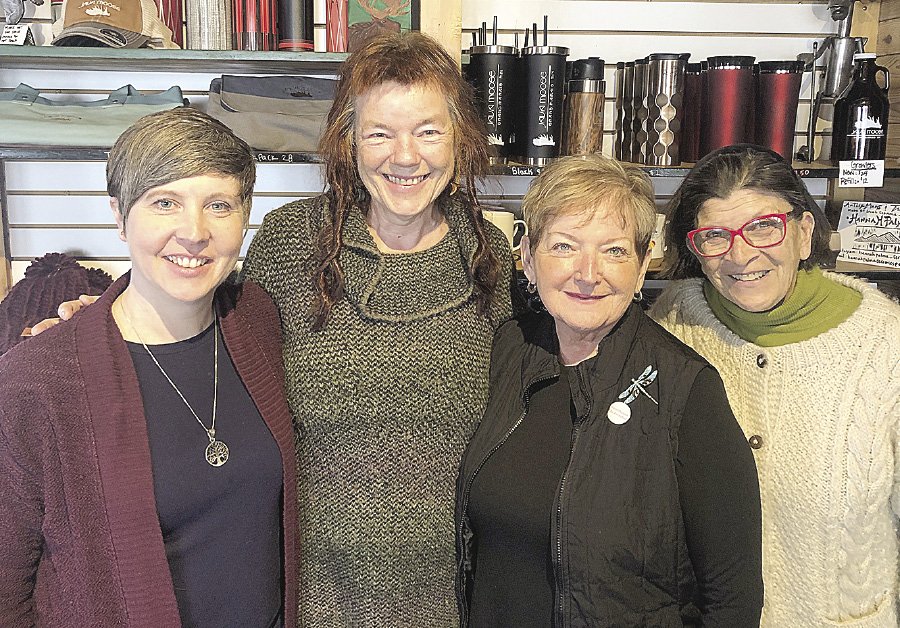None of us remember, let alone directed, the circumstances of our births. But now we may be able to have a say in the circumstances of our death when our time comes, as inevitably it must. Enter the Death Doulas of Cook County: Jean Skeels, Suzanne Sherman, Margy Nelson and Pat Campanaro.
“There are doulas to assist our being born,” says Nelson. “A death doula is related to that, for people who need someone to walk with them on their final journey.”
“I never knew how much death was like birth,” says Karen Kobey, who recently lost her longtime partner, Ellen Stubbs, to cancer. “You can’t know ahead what it’s going to be like. It’s work—that’s what I learned from Suzanne (Sherman).”
Kobey’s experience of the decline and death of her partner is illustrative of the work of the doulas.
“Suzanne met with us, shared resources, listened to us. There were a lot of questions to think about, especially as Ellen needed more and more care,” she remembers. “There was so much involved, and Suzanne pointed out that I didn’t have to be responsible for all of it.”
In the journey toward a loved-one’s death, the survivor(s) may find themselves overwhelmed with powerful emotions and a feeling of helplessness.
“Suzanne told me that what I was feeling was normal in such an experience,” Kobey says. “She was there for both Ellen and I, urging me to accept the help and guidance I needed. And she was right: you can never be ready for this.”
Fortunately, Kobey also had a well of support upon which to draw, and not only for perspective. Her spiritual community and network of friends provided other needful help, like meals and keeping vigil so that Kobey could take an occasional break. And in her role as friend and doula, Sherman kept vigil with them in Stubbs’ final hours. In keeping with the mandate of the doulas, Sherman also assisted with such details as notifying the funeral home, and provided aftercare and follow-up for Kobey in the ensuing weeks.
“Care Partners here was very helpful, too,” Kobey says. “We have no hospice, but there is the care nurse and the doulas. I am in a wash of gratitude for the support we’ve had.”
In keeping with their work as part of a holistic approach to the end of life, the doulas often work as a team as well as in cooperation with Cook County’s Care Partners program. Now in their second year, the doulas are still a relatively new phenomenon in the area.
“Not a lot of people know about this,” says Nelson. “So, part of what we do is an education process.”
To that end, the doulas organize what are called Death Cafés monthly in Grand Marais.
“We create a space,” Sherman says, “where people can talk about death, ask questions, express fears and grieving around it.”
The cafés, now convened on Zoom due to the pandemic, do not go with planned agendas, but rather change in theme, depending on who attends. Sometimes, the time is taken up with an emotional sharing about a loved-one’s death.
“Some of those who come, tell us that they can’t talk about this anywhere else,” says Nelson.
“Some people are scared,” Sherman adds, “but this process can take some of the sting out of death.”
Taking the sting out of death is not for the faint-hearted or the untrained. All the doulas received formal training and are in the process of certification from the International End of Life Doula Association (INELDA). The Cook County doulas are deeply enthusiastic about the program.
“I felt like I had been walked through all the stages of death that could happen,” Nelson remembers quietly. “It helps you think about what kind of a death would you want, and in our work, we get to see some of the wonderful things that people want to put on the table.”
“It’s all about what the dying person wants,” Sherman says. “What do you want to see? Smell? Hear? Who do you want with you, and so on? We as doulas are a neutral but caring presence, and confidentiality is huge with us.”
“One of the big things about being a death doula is being able to touch, comfort the dying and the survivors,” say Sherman and Nelson. “But now with COVID-19, we can’t work like that just yet. We can Zoom with the family, at least, and we can still offer aftercare, which is so important. We don’t just walk away once the dying person is gone.”
For more information, contact Care Partners at (218) 387-3788 or visit: carepartnersofcookcounty.org.
The next Death Café convenes at 6 p.m., Thursday, Nov. 19, online. Watch for an announcement.

